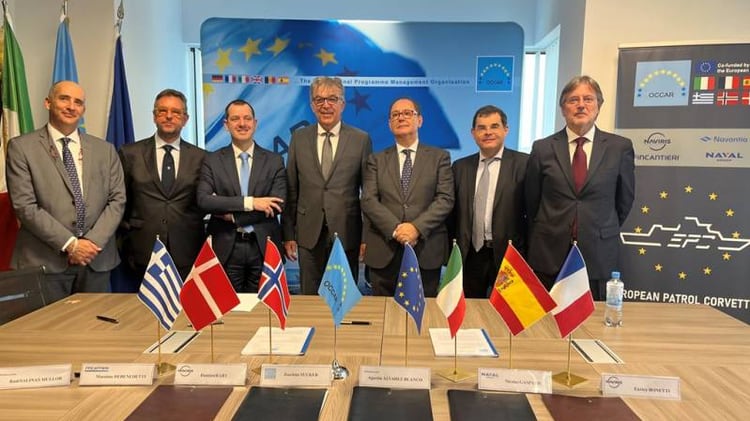The Diplomat
The first phase of the European Patrol Corvette (EPC) project, in which Navantia is participating, began last Tuesday with the signing in Rome of the contractual documents for the MMPC (Modular and Multirole Patrol Corvette) project, by OCCAR (Organisation for Armaments Cooperation) officials and the consortium formed by Naviris, Fincantieri, Naval Group, Navantia and other beneficiaries from Greece, Denmark and Norway.
The total value of this first phase is 87 million euros and is strongly supported by the European Commission through the European Defence Fund. In fact, 60 million will be financed by the EC in the form of “grants”, while the remaining 27 million will be financed by the Member States (Italy, France, Spain, Denmark, Greece and Norway) that decided to support the project. OCCAR will manage the entire project, acting as Granting Authority, mandated by the EC, and Contracting Authority, mandated by the above-mentioned Member States.
On the same day, the companies’ delegates signed a consortium agreement, which aims to steer the implementation of the project, maximising synergies and collaboration between the European shipbuilding industries.
With a duration of 24 months, this first MMPC contract aims to provide the initial design of a next generation ship class, the European Patrol Corvette (EPC), launched in the context of a PESCO project (1). The EPC will initially include two variants: a long-range multi-role corvette and a full combat multi-role corvette, both maximising innovations, synergies and interaction between the three main European shipbuilding architects and manufacturers: Naval Group, Fincantieri and Navantia.
The EPC programme represents a breakthrough in European defence cooperation. It will make a strong contribution to European sovereignty in the field of second-line vessels, strengthening European industry, increasing efficiency and reducing delays in moving from military need to delivery to navies. By developing together a new class of ships, the four companies aim to secure and promote European sovereignty based on European in-house skills and expertise. This signature highlights the capabilities of the nations, through management by OCCAR, to work efficiently together and share the knowledge of their prominent naval industries to support European navies. It also shows the importance and effectiveness of the EDF in supporting European Member States in the development of European-made defence capabilities.
Based on innovative and disruptive technologies, the new class will represent a group of smart, innovative, affordable, sustainable, interoperable and flexible vessels designed to fulfil a wide range of missions in a constantly evolving context. Depending on the requirements specified by each navy, the vessels will be able to perform a wide range of missions in operational contexts as diverse as offshore surveillance with a high degree of autonomy, or coastal missions.







